- Home
- Burt L. Standish
Wild Adventures round the Pole Page 2
Wild Adventures round the Pole Read online
Page 2
momentary,but it showed a deal of kindly feeling. "Always call me Ralph," hesaid, "always, McBain, always. When we are back once more at sea I'llcall you captain, not till then. But what is the something more thatmakes our men so happy?"
"Why, your kindly manner, Ralph boy. You mix with them, you talk withthem, and take an interest in all their doings, and you positively seemto know every one of them by name. Mind you, that extra half-holidayisn't thrown away: they work all the harder, and they are happy. Why,listen to them now."
He paused, and held up one hand. From bows to stern of the vessel therearose the sound of industry, incessant, continual; but high over theclang of hammers and the grating noise of saws there arose the voice ofsong.
"They sing, you see," continued McBain; "but they don't put down theirtools to sing. But here comes old Ap. What cheer, Mr Ap Ewen?"
Those of my readers who knew Ap as he was two or three years ago--thelittle stiff figure-head of a fellow--would be surprised to see him now.[_Vide_ "Cruise of the Snowbird." Same Author and Publishers.] He isfar more smartly dressed, he is more active looking, and more the man,had taken him in hand. He had caused him to study his trade ofboat-builder in a far more scientific fashion, with the result that hewas now, as our story opens, foreman over all the men employed on theship in which Ralph Leigh stood.
Indeed, McBain himself, as well as Ap, were good examples of whatearnest study can effect. There is hardly anything which either boy orman cannot learn if he applies his mind thereto.
"What cheer, Mr Ap Ewen?" said McBain.
"More hands wanted, sir," said Ap, pulling out his snuff-box and takinga vigorous pinch.
"More hands, Ap?" exclaimed McBain.
"Ay, sir, ay; look you see," replied Ap, "you told me to hurry on, yousee, and on Monday we shall want to begin the saloon bulkheads."
"Bravo! Ap, bravo! come to my office to-night at seven, and we'll putthat all straight."
"Thank you, sir," said Ap, touching his hat and retiring.
Ralph Leigh was owner of the splendid composite steamship that was nowfast nearing her completion.
She was not being built by contract, but privately, and McBain was headcontroller of every department, and for every department he had hiredexperts to carry on the work. The vessel was designed for specialservice, and therefore she must be a vessel of purity, a vessel ofstrength. There must not be a flaw in her, not a patch--all must besolid, all must be good. McBain had hired experts to examine everythingere it was purchased, but he made use of his own eyes and ears as well.The yard in which the ship was built was rented, and every bit of timberthat entered it was tested first, whether it were oak or teak, pine,mahogany, or cedar; and the iron the same, and the bolts of copper andsteel, so that Captain McBain's work was really no sinecure.
"Well, then," said Ralph, "I've been over all the ship; I'm extremelypleased with the way things are going on, so if you have nothing more tosay to me I'm off. By the way, do the people still flock down on Fridayafternoons to look over the ship?"
"They do," replied McBain; "and poor old Ap, I feel sorry for him. _He_gets no Friday half-holiday; he won't let me stop, but he insists uponremaining himself to show the people round."
"And the people enjoy it?"
"They do. They marvel at our engines, as well they may. The gear, sosimple and strong, that Ap and I invented for the shipping andunshipping of the rudder, and the easy method we have for elevating thescrew out of the water and reducing the vessel to a sailing ship, theythink little short of miraculous. They are astonished, too, at theextraordinary strength of build of the ship. Indeed, they are highlycomplimentary to us in their general admiration. But," continuedMcBain, laughing aloud, "it would amuse you to hear the remarks of someof these good, innocent souls. The two 12-pounder Dalgrens areuniversal favourites. They pat them as if they loved them. One girllast Friday said `they just looked for a' the warld like a couple o' bigiron soda-water bottles.' They linger in the armoury; old Ap shows themour `express' rifles, and our `bone-crushers,' and the hardened andexplosive bullets: then he takes them to the harpoon-room and shows themthe harpoons, and the guns, and the electric apparatus, and all theother gear. They stare open-mouthed at the balloon-room and thesledge-lockers, but when they come to the door of the torpedo-chamberthey simply hurry past with looks of awe. It is currently reported thatwe are bound for the very North Pole itself; I'm not sure we are notgoing to bring it back home with us. Anyhow, they say that as soon aswe reach the ice, we are to fill our balloons, attaching one to eachmast and funnel, and float away and away over the sea of ancient iceuntil we reach the Pole."
Ralph laughed right merrily, and next minute he was over the side, withhis face set townwards, trudging steadily on to the railway-station. Itwas only a trifle over three miles; there were cabs to be had inabundance, but what young man would ride if he had time to walk?
Ralph was going home. Not to his fair English home far away in thesouth, for ever since, in the early spring-time--and now it was autumn--the keel of the ship--_his_ ship--had been laid, Ralph had taken up hisabode in a rustic cottage by the banks of a broad-bosomed lake in theHighlands of Argyll. Wild though the country was all around, it was butfour miles from the railway, and this journey he used to accomplishtwice or oftener every week, on the back of a daft-looking Welsh ponythat he had bought for the purpose. Once on board the train, two hourstook him to the city, and thence a brisk walk to the building-yard.
He had watched, week after week, the gradual progress of his shiptowards completion, with an interest and a joy that were quite boyish.He dearly loved to see the men at work, and listen to their cheerfulvoices as they laboured. Even the smell of the pine or cedar shavingswas perfume to Ralph, and the way he used to climb about and wander overand through the ship, when she was little more than ribs, knees, andbeams, was quite amusing.
But he was nevertheless always happy to get back to his Highland home,his books, his boat, and his fishing-rod. She was a widow who owned thehumble cottage, but she was kind and good, and Ralph's rooms, thatlooked away out over the lake, were always kept in a state of perfectcleanliness. The widow had one little daughter, a sweetly pretty andintelligent child, over whose fair wee head five summers had hardlyrolled. Jeannie was her name, Jeannie Morrison, and she was an especialpet of Ralph's. She and the collie dog always came gleefully down theroad to meet him on his return from the distant city, and you may beperfectly sure he always brought something nice in his pocket for thepair of them.
When tired of reading, Ralph used to romp with wee Jeannie, or take heron his knee and tell her wonderful stories, which made her blue eyesgrow bigger and more earnest than ever as she listened.
In fact, Jeannie and Ralph were very fond of each other, indeed, andevery time he went to a romantic little island out in the lake to fish,he took Jeannie in the stern of the boat, and the time passed doublyquick.
"Oh, Mista Walph! Mista Walph!" cried Jeannie, bursting into Ralph'sroom one afternoon, clapping her hands with joy. "Mista McBain iscoming; Capping McBain is coming."
"Yes," said Mistress Morrison, entering behind her little daughter."I'm sure you'll be delighted, sir, and so am I, for the captain hasn'tbeen here for a month."
Then Ralph got his hat, and, accompanied by the honest collie and hisfavourite Jeannie, went off down the road to meet McBain and bid himwelcome to his Highland home.
CHAPTER TWO.
THE DINNER BY THE LAKE--RORY'S RUN ROUND AFRICA--THE RETURN OF THEWANDERERS.
"When did you hear from Allan and Rory?" asked McBain that day, as theywere seated at dinner in the little Highland cottage.
Mrs Morrison had done her best to put something nice before them, andnot without success either--so thought Ralph, and so, too, thought hisguest. At all events, both of them did ample justice to that noble laketrout. Five pounds did he weigh, if he weighed an ounce, and as red washe in flesh as if he had been fed upon beet. The juicy joint ofmountain mutton that followe
d was fit to grace the table of a prince--itwas as fragrant and sweet as the blooming heather tops that had broughtit to perfection. Nor was the cranberry tart to be despised. Theberries of which it was composed had not come over the Atlantic in abarrel of questionable flavour--no, they had been culled on the dewybraelands that very morning by the fair young fingers of wee JeannieMorrison herself. The widow did not forget to tell them that, and itdid not detract from their enjoyment of the tart. For drink they hadfragrant heather ale--home-brewed.
"When did I hear from Allan and Rory?" said Ralph, repeating McBain'squestion; "from the first, not for weeks--he is a lazy boy; from thelatter, only yesterday morning."
"And what says Rory?" asked

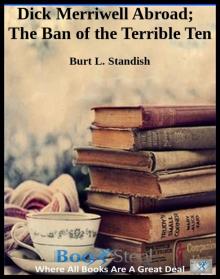 Dick Merriwell Abroad; Or, The Ban of the Terrible Ten
Dick Merriwell Abroad; Or, The Ban of the Terrible Ten Wild Adventures round the Pole
Wild Adventures round the Pole Storm-Bound; or, A Vacation Among the Snow Drifts
Storm-Bound; or, A Vacation Among the Snow Drifts In the Yellow Sea
In the Yellow Sea Frank Merriwell's Triumph; Or, The Disappearance of Felicia
Frank Merriwell's Triumph; Or, The Disappearance of Felicia Treasure of Kings
Treasure of Kings Bert Wilson's Twin Cylinder Racer
Bert Wilson's Twin Cylinder Racer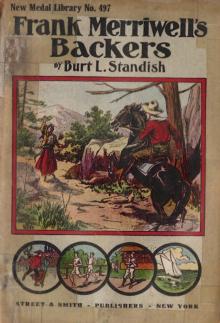 Frank Merriwell's Backers; Or, The Pride of His Friends
Frank Merriwell's Backers; Or, The Pride of His Friends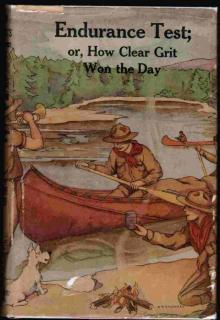 Endurance Test; or, How Clear Grit Won the Day
Endurance Test; or, How Clear Grit Won the Day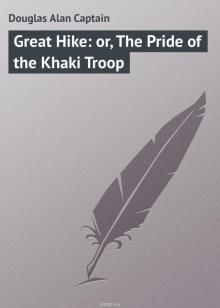 Great Hike; or, The Pride of the Khaki Troop
Great Hike; or, The Pride of the Khaki Troop The Swan and Her Crew
The Swan and Her Crew A cup of sweets, that can never cloy: or, delightful tales for good children
A cup of sweets, that can never cloy: or, delightful tales for good children Frank Merriwell's Bravery
Frank Merriwell's Bravery Frank Merriwell Down South
Frank Merriwell Down South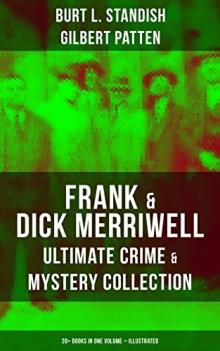 Dick Merriwell's Trap; Or, The Chap Who Bungled
Dick Merriwell's Trap; Or, The Chap Who Bungled The Trail of the Seneca
The Trail of the Seneca Wild Life in the Land of the Giants: A Tale of Two Brothers
Wild Life in the Land of the Giants: A Tale of Two Brothers From Squire to Squatter: A Tale of the Old Land and the New
From Squire to Squatter: A Tale of the Old Land and the New The Cruise of the Snowbird: A Story of Arctic Adventure
The Cruise of the Snowbird: A Story of Arctic Adventure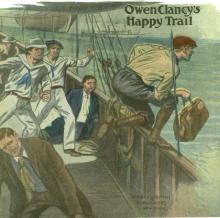 Owen Clancy's Happy Trail; Or, The Motor Wizard in California
Owen Clancy's Happy Trail; Or, The Motor Wizard in California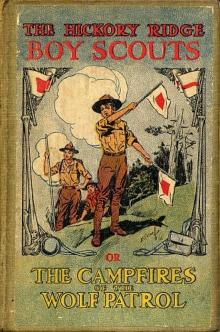 Boy Scouts: Tenderfoot Squad; or, Camping at Raccoon Lodge
Boy Scouts: Tenderfoot Squad; or, Camping at Raccoon Lodge Sing a Song of Sixpence
Sing a Song of Sixpence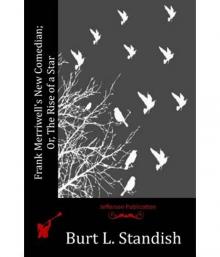 Frank Merriwell's New Comedian; Or, The Rise of a Star
Frank Merriwell's New Comedian; Or, The Rise of a Star The Sa'-Zada Tales
The Sa'-Zada Tales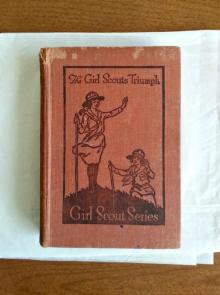 The Girl Scout's Triumph; or, Rosanna's Sacrifice
The Girl Scout's Triumph; or, Rosanna's Sacrifice Wild Adventures in Wild Places
Wild Adventures in Wild Places Fairies I Have Met
Fairies I Have Met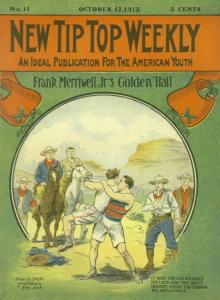 Frank Merriwell's Son; Or, A Chip Off the Old Block
Frank Merriwell's Son; Or, A Chip Off the Old Block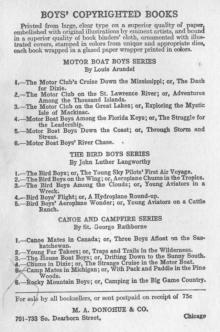 Motor Boat Boys' River Chase; or, Six Chums Afloat and Ashore
Motor Boat Boys' River Chase; or, Six Chums Afloat and Ashore Frank Merriwell's Athletes; Or, The Boys Who Won
Frank Merriwell's Athletes; Or, The Boys Who Won Bart Keene's Hunting Days; or, The Darewell Chums in a Winter Camp
Bart Keene's Hunting Days; or, The Darewell Chums in a Winter Camp Captain June
Captain June